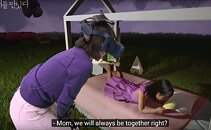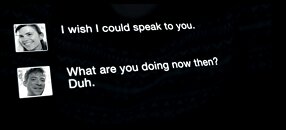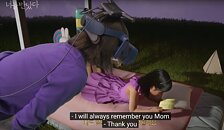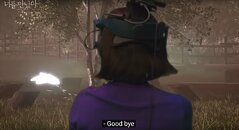Raevenlord
News Editor
- Joined
- Aug 12, 2016
- Messages
- 3,755 (1.16/day)
- Location
- Portugal
| System Name | The Ryzening |
|---|---|
| Processor | AMD Ryzen 9 5900X |
| Motherboard | MSI X570 MAG TOMAHAWK |
| Cooling | Lian Li Galahad 360mm AIO |
| Memory | 32 GB G.Skill Trident Z F4-3733 (4x 8 GB) |
| Video Card(s) | Gigabyte RTX 3070 Ti |
| Storage | Boot: Transcend MTE220S 2TB, Kintson A2000 1TB, Seagate Firewolf Pro 14 TB |
| Display(s) | Acer Nitro VG270UP (1440p 144 Hz IPS) |
| Case | Lian Li O11DX Dynamic White |
| Audio Device(s) | iFi Audio Zen DAC |
| Power Supply | Seasonic Focus+ 750 W |
| Mouse | Cooler Master Masterkeys Lite L |
| Keyboard | Cooler Master Masterkeys Lite L |
| Software | Windows 10 x64 |
VR has been hailed as the next coming of truly ingenious, engrossing, enveloping experiences, and to some extent, it already does offer those. There are still limitations to the technology and the level of realism it can impart (there is a whole slew of senses we need to trigger for truly enveloping experiences, of course), but I feel we sometimes get somewhat limited in the way we look at VR. Of course, we can all imagine video games built in VR - and when we do, we likely imagine them as they were presented to us in Steven Spielberg's Ready Player One.
Then there are other use-cases, such as real-estate experiences that place you right inside your future home and allow you to see the changes you'd make. Architecture design, engineering, game world design, even strolls through museums, your mind a subatomic particle able to instantly travel to foreign countries and explore their marvels. All for this, mind you, without ever leaving the comfort of our home, without the required expenses and no wasted time with travelling or passport checks - all, however, simulated. But what if VR could go even further? What if VR could be used as a coping mechanism? What if you could meet your dead parents, siblings... Or children? This is the story I bring to you today: of how VR was used to reunite a mother with her deceased seven-year-old girl. This is the story of Ji-sung and her daughter Nayeon.

The story begins with Nayeon, a seven-year-old girl which was like all seven-year-olds - they're curious, they're energetic, they mostly still see the world through a magical filter made of potential. Nayeon, however, was diagnosed with hemophagocytic lymphohistiocytosis (HLH), a life-threatening disease which results in inflammation and failing internal organs. Scientifically, histiocytes and lymphocytes, two types of white blood cells, attack other cells present in your body - your body essentially starts devouring itself. After a month in the hospital, Nayeon passed away.
Then, South Korean news network MBC produced a documentary - Meeting You, which you can find below - where VR equipment was used to recreate Nayeon in VR scenarios in such a way that Ji-sung, her mother, was capable of actually interacting with a digital recreation of her daughter. The virtual Nayeon was created over eight months of toiling - motion capture, photogrammetry, and modeling of the 3D representation of Nayeon were done with some inspiration drawn from her sibling. Using an HTC Vive Pro, Vive trackers, and wireless adapter, Ji-sung revisits places they'd frequent together - a park - where Ji-Sung and a virtual reconstruction of her daughter interact - of sorts. I'll be honest with you. I found some glaring issues that I can only believe would terrify me if I were in her place - some clipping movements, the absence of actual interconnectedness between my speech, my words, my message, and my little girl's reactions. However, for Ji-sung, this seems to be a cathartic moment - her emotion is raw. Her pain is real. And she goes through the motions in what appears to be akin to a dream. The interaction is scripted, of course - from Nayeon's part. Her mother, however, is all emotion and belief.
There are so many ethical questions here I would have to write a treaty on this matter. The question of this being a valid coping mechanism or just a constant re-traumatization is a real one. I can certainly see scenarios where some people would enter a neverending loop that would actually prevent them from coping and moving on with their lives should they actually experience this - even more so if it sees increased development. What if the past messages, videos, photos and interactions between you and your daughter could be processed by AI to generate a true-to-life digital render of your daughter in your own home environment? If she actually interacted with you in a non-scripted manner? Would that help you settle any regrets, any half-said thoughts, any unfinished business, and go on with your life in peace - or would you look to experience what you lost over, and over again?

I would like to make a small detour here to reference the television series Black Mirror. In Episode One of Season Two of the show, "Be Right Back", a story is told about Martha, who loses her boyfriend in a car crash. Finding out she is pregnant with their child, she decides to try out a digital service with various tiers, of which the first ones involve creating an artificial intelligence of sorts by mining through the digital footprint of her deceased boyfriend - much like it was done with Nayeon.

However, the show dials this concept up to 11, as science fiction tends to do. The point here is that in that episode, what begins as a source of comfort - and exceeds the boundaries of what I'd personally call healthy coping and a search for closure - then starts to show cracks and splinters. It just isn't real - no matter how close (and in the episode, it's as close as you can imagine) it can be. The show ends in a bleak, somewhat terrifying note, although it seems that Martha actually managed to cope with the loss of her boyfriend, and their daughter actually managed to meet... a version... of her father - which she wouldn't otherwise get to do.

I can not even begin to fathom the pain of losing one's child. I won't pretend to know how wrecking it must be to see the world's order cast aside. However, I am able to see how a mother would feel she didn't have the time - the chance - to try and cope with such a loss in the best way possible. I'm not one to judge the way others deal with their problems, with their pain. I believe, however, that any ethical concerns will be superseded by the fact that there is an obvious market for these reconstructions, and that the market will follow what it needs to follow to make these an eventual reality. How should we face this, though? How will it end up? How many people will end up happier because of it - and how many will enter a re-traumatization loop that will only exacerbate their pain?
I think the only question we can really try to answer is this one: what would we ourselves do?


View at TechPowerUp Main Site
Then there are other use-cases, such as real-estate experiences that place you right inside your future home and allow you to see the changes you'd make. Architecture design, engineering, game world design, even strolls through museums, your mind a subatomic particle able to instantly travel to foreign countries and explore their marvels. All for this, mind you, without ever leaving the comfort of our home, without the required expenses and no wasted time with travelling or passport checks - all, however, simulated. But what if VR could go even further? What if VR could be used as a coping mechanism? What if you could meet your dead parents, siblings... Or children? This is the story I bring to you today: of how VR was used to reunite a mother with her deceased seven-year-old girl. This is the story of Ji-sung and her daughter Nayeon.

The story begins with Nayeon, a seven-year-old girl which was like all seven-year-olds - they're curious, they're energetic, they mostly still see the world through a magical filter made of potential. Nayeon, however, was diagnosed with hemophagocytic lymphohistiocytosis (HLH), a life-threatening disease which results in inflammation and failing internal organs. Scientifically, histiocytes and lymphocytes, two types of white blood cells, attack other cells present in your body - your body essentially starts devouring itself. After a month in the hospital, Nayeon passed away.
Then, South Korean news network MBC produced a documentary - Meeting You, which you can find below - where VR equipment was used to recreate Nayeon in VR scenarios in such a way that Ji-sung, her mother, was capable of actually interacting with a digital recreation of her daughter. The virtual Nayeon was created over eight months of toiling - motion capture, photogrammetry, and modeling of the 3D representation of Nayeon were done with some inspiration drawn from her sibling. Using an HTC Vive Pro, Vive trackers, and wireless adapter, Ji-sung revisits places they'd frequent together - a park - where Ji-Sung and a virtual reconstruction of her daughter interact - of sorts. I'll be honest with you. I found some glaring issues that I can only believe would terrify me if I were in her place - some clipping movements, the absence of actual interconnectedness between my speech, my words, my message, and my little girl's reactions. However, for Ji-sung, this seems to be a cathartic moment - her emotion is raw. Her pain is real. And she goes through the motions in what appears to be akin to a dream. The interaction is scripted, of course - from Nayeon's part. Her mother, however, is all emotion and belief.
There are so many ethical questions here I would have to write a treaty on this matter. The question of this being a valid coping mechanism or just a constant re-traumatization is a real one. I can certainly see scenarios where some people would enter a neverending loop that would actually prevent them from coping and moving on with their lives should they actually experience this - even more so if it sees increased development. What if the past messages, videos, photos and interactions between you and your daughter could be processed by AI to generate a true-to-life digital render of your daughter in your own home environment? If she actually interacted with you in a non-scripted manner? Would that help you settle any regrets, any half-said thoughts, any unfinished business, and go on with your life in peace - or would you look to experience what you lost over, and over again?

I would like to make a small detour here to reference the television series Black Mirror. In Episode One of Season Two of the show, "Be Right Back", a story is told about Martha, who loses her boyfriend in a car crash. Finding out she is pregnant with their child, she decides to try out a digital service with various tiers, of which the first ones involve creating an artificial intelligence of sorts by mining through the digital footprint of her deceased boyfriend - much like it was done with Nayeon.

However, the show dials this concept up to 11, as science fiction tends to do. The point here is that in that episode, what begins as a source of comfort - and exceeds the boundaries of what I'd personally call healthy coping and a search for closure - then starts to show cracks and splinters. It just isn't real - no matter how close (and in the episode, it's as close as you can imagine) it can be. The show ends in a bleak, somewhat terrifying note, although it seems that Martha actually managed to cope with the loss of her boyfriend, and their daughter actually managed to meet... a version... of her father - which she wouldn't otherwise get to do.

I can not even begin to fathom the pain of losing one's child. I won't pretend to know how wrecking it must be to see the world's order cast aside. However, I am able to see how a mother would feel she didn't have the time - the chance - to try and cope with such a loss in the best way possible. I'm not one to judge the way others deal with their problems, with their pain. I believe, however, that any ethical concerns will be superseded by the fact that there is an obvious market for these reconstructions, and that the market will follow what it needs to follow to make these an eventual reality. How should we face this, though? How will it end up? How many people will end up happier because of it - and how many will enter a re-traumatization loop that will only exacerbate their pain?
I think the only question we can really try to answer is this one: what would we ourselves do?


View at TechPowerUp Main Site






